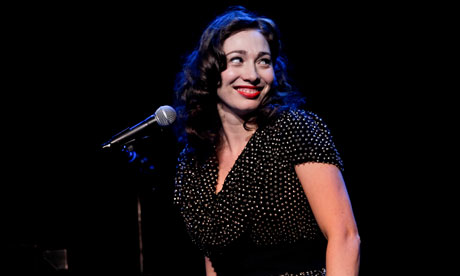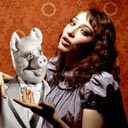A band of all-female punk demonstrators, Pussy Riot, are currently languishing in jail in Russia after a guerrilla gig in a church protesting against Russia's strongman president, Vladimir Putin. Their imprisonment has become an international cause célèbre.
What if, you wonder, Regina Spektor had grown up in her native Russia? Might she have ended up in Pussy Riot? As it is, Spektor moved to the Bronx as a child, and became a kind of arty-boho heir to Tori Amos. Spektor has been feted by Putin's opposite number, invited to sing at the White House in 2010.
This idle game of "what if" is prompted by one of Spektor's songs, Ballad of a Politician – a protest song, of sorts. In a minor key that recalls Leonard Cohen, Spektor likens craven politicians to hookers, her voice rising and rising in emphasis; it's one of the moments of tonight's gig when the dust motes in the Albert Hall zing around a little more urgently. As a Russian émigré, whose Jewish identity is palpable in her life and work, she has a take on power relationships perhaps more nuanced than others of her generation.
Spektor's Russian ancestry comes to the fore palpably on The Prayer of François Villon, a song by poet and songwriter Bulat Okudzhava, in which Spektor sings in Russian and easily pins the crowd's ears to the wall behind.
She is complex in so many good ways – and a few unfortunate ways too. This gig is Spektor's most prestigious UK show to date. She originally emerged in 2001 when, in a pincer-like movement of coolness, she was aligned both with New York's bratty anti-folk movement and the Strokes, whose Nikolai Fraiture (half-Russian) remains a friend. In 2006, her Begin to Hope album broke Spektor through from cult obscurity to wider renown.
To be largely unmoved by Regina Spektor is, then, to be largely unmoved by complexity, pianos, idiosyncrasy and exuberance, all of which are in generous supply tonight. It would be wrong to suggest that Spektor's set is anything less than a triumph. A woman in the audience shrieks: "We love you, Regina!" like a small banshee every couple of minutes. Spektor is a genial host, fretting about having her back to half the audience; worrying about a commotion in the crowd ("Is someone sick?"). The standing ovation greeting a final, restarted Samson (one of the night's best) is instant and spring-loaded – none of that dutiful looking around to see who else is standing up.
But non-aligned spectators (well, me) struggle a little to grasp the appeal of many of her other songs, even when I have gone to bat in print for every single other distinctive female auteur out there, from Kate Bush to Joanna Newsom – who, by the way, premiered a new song last week.
It's not Spektor's eccentricity that irks; it might be her breezy theatricality. Spektor's work seems to owe something to the tradition of light opera or vaudeville, even. Many of her compositions seem to have extracurricular oompah where no oompah is required. The song How might provide an Adele moment for Spektor, were she seeking one. It's a heartbreak tune, from her most recent album, What We Saw From the Cheap Seats. But Spektor cannot resist filling it with big pranging bunny hops on the piano. Why does she need to do a terrible Italian accent during Oh Marcello? Why, on Fidelity, does the word "heart" require so many syllables?
There are moments when she makes your blood run cold. Laughing With is a song from Spektor's 2009 album Far, and it rips unfashionably into the agnosticism of those for whom disease and ruin remain at arm's length, confined to a novel, or a drama extinguishable by remote control. "No one laughs at God in a hospital/ No one laughs at God in a war," she spits. But then she has to ruin it by imagining God at a cocktail party, much like the execrable Joan Osborne once imagined God being "like a stranger on a bus".
There's a passage on Open where Spektor stops being florid. Instead, she taps into a more visceral wellspring of feeling. She gasps deeply and repeatedly, and it's not irritating. She howls wordless "ahs" while banging on the piano, and she is magnificent. But there is too little of this power in the rest of her work.






